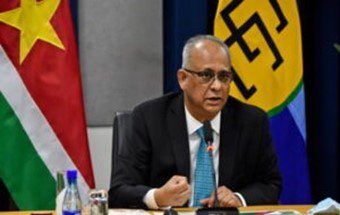Secretary General of the Organization of American States (OAS), Albert Ramdin, said Wednesday that the Caribbean Community (CARICOM) will play a “critical role” in ongoing efforts to restore stability and security in Haiti.
Addressing the OAS Permanent Council under the theme “Towards a Haitian-Led Roadmap for Stability and Peace with Regional and International Support,” Ramdin stressed the need for more effective and transparent coordination, ensuring all member states are fully informed and able to identify areas where they can provide additional support.
The Roadmap is described as a hemispheric proposal to support Haiti, designed to link immediate stabilization with long-term structural reforms. It is intended as a flexible and dynamic framework, guided by Haitian leadership and strengthened through coordination with regional and international partners.
“So coordination, in the first instance, in the Inter-American system; the coordination role will also be with CARICOM and with the United Nations. But as we speak for the hemisphere, it will be for the OAS,” Ramdin said.
He noted that while the OAS can facilitate political support, it lacks a mandate for peacekeeping operations. “We will facilitate as much as can be political support…because beyond that we can’t go. We do not have a mandate for peacekeeping operations to manage. We can do a lot in the context of facilitating that process,” he said.
Ramdin highlighted CARICOM’s contributions so far, saying the 15-member grouping, which includes Haiti, “has done, already, a lot of good work in terms of political facilitation with Haitian stakeholders.” He added that further expansion of this role is possible, depending on discussions with Haitian authorities, including the Transitional Presidential Council and the prime minister’s office.
He also pointed to the looming expiration of the Transitional Presidential Council’s mandate in February 2026 as a key issue. “We need to see what will come after, because this is not a plan for six months only. This is far longer. So that is a political issue, and we believe that CARICOM can be very helpful. And with the support of both the OAS and the UN, we look forward to the guidance of their experience on the engagement process.”
On the role of the United Nations, Ramdin said the peacekeeping mandate remains under the UN Security Council (UNSC). “The possibility of a resolution to fine-tune how that is going to work in the future, I hope that will be brought to the table of the UNSC very quickly,” he said.

 6 months ago
28
6 months ago
28


 English (US) ·
English (US) ·